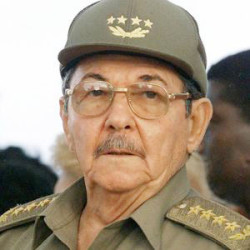The raising of the US flag at the newly opened American embassy in Havana is an important story, but I can’t help finding much of the US media coverage surrounding the event to be repetitive, boring and frivolous.
 How many more cheerful stories about 1950s Chevro-lets on the streets of Havana, or about formerly US-owned Cuban casinos, or about the Cubans’ ingenuity to repair decades old US-made refrigerators will we have to endure on the occasion of US Secretary of State John Kerry’s visit to preside over the flag-raising ceremony of the US Embassy in Havana?
How many more cheerful stories about 1950s Chevro-lets on the streets of Havana, or about formerly US-owned Cuban casinos, or about the Cubans’ ingenuity to repair decades old US-made refrigerators will we have to endure on the occasion of US Secretary of State John Kerry’s visit to preside over the flag-raising ceremony of the US Embassy in Havana?
True, nostalgia sells, and many people love these stories, but there is a big dose of hypocrisy surrounding this frivolous view of today’s Cuba.
It obscures the fact that Cuba remains one of the world’s closest dictatorships, and that most news organizations try not to be too harsh on the Cuban regime because they don’t want to be denied Cuban entry visas for their correspondents. For as long as I can remember, Cuba denies entry visas to foreign journalists it considers too critical.

Hypocrisy No 1: Most news organizations resort to all kinds of euphemisms to avoid calling Cuba a dictatorship, or Cuban leader Gen Raúl Castro a military dictator. In fact, the Castro brothers have not allowed any free elections, nor opposition parties, nor independent media for more than five decades. Gen Raúl Castro often addresses the nation in full military garb.
And yet, most news organizations do all kinds of verbal pirouettes to avoid the ‘d’ word when talking about the Castro brothers. We most often refer to Fidel Castro as “the leader of the Cuban revolution,” or Cuba’s “historic leader,” and to Raúl Castro as “president” or “head of government.”
In fact, there is no dictionary in the world whose definition of “dictator” would not describe the Castro brothers. Under my Merriam-Webster dictionary, a dictator is “a person who rules a country with total authority and often in a cruel or brutal way.”
Well, according to the Cuba Archive cubaarchive.org) research group, there are 3,117 documented cases of executions — with names and dates — and 1,162 cases of extrajudicial killings by the Castro regime. “In no way does that imply it is a complete count of actual deaths or disappearances,” Cuba Archive director Maria Werlau says of the figures.
Contrary to what many right-wingers believe, the media’s allergy to calling the Castro brothers “dictators” does not result from an alleged leftist bias by journalists. The international media treated former Chilean dictator Gen Augusto Pinochet with similar respect, until he died.
It seems that dictators only become dictators once they die. The little-known reality behind the hypocrisy of calling Pinochet a “late dictator” and Fidel Castro a “former leader” is that Cuba still has a regime in place that decides which journalists can get a visa into the country, and which won’t.
Hypocrisy No 2: While much of the media coverage surrounding last week’s US Embassy flag-raising ceremony focuses on nostalgia and history, very little centres on the fact that the Cuban regime has stepped up repression against peaceful opponents in recent weeks.
Just last Sunday, the government detained about 90 dissidents who were staging a peaceful protest against the regime in Havana, Agence France-Presse reported. Last month, there were 674 detentions of peaceful opponents, including 21 in which dissidents were badly beaten by police, according to Cuba’s Commission of Human Rights and National Reconciliation.
Since Obama’s Dec 17 announcement of the start of normalization talks with Cuba, there have been more than 3,000 political detentions in Cuba, most of them for brief periods, according to the commission’s numbers.
Hypocrisy No 3: While most of us don’t oppose the normalization of relations with Cuba, many seem to forget that the Obama administration has repeatedly promised that the re-establishment of full diplomatic ties “will include continued strong support for improved human rights conditions and democratic reforms in Cuba.”
But most peaceful opponents say they were not even consulted by the Obama administration during the negotiations, and at the time of this writing it looked like Kerry would only invite Cuban officials — and not government opponents — to the US Embassy’s official flag-raising ceremony in Havana on Friday. Instead, they may have been invited to a more
social event at the US chargé d’affaires’ residence.
My opinion: It’s time to pay a little less attention to 1950s pre-revolution Chevrolets in Cuba, and a little more attention to the post-revolution people in Cuba, who — mainly because of a decrepit family dictatorship — live in one of the poorest, most backward and repressive countries in the Americas.
© The Miami Herald, 2015. Distributed by Tribune Media Services.








